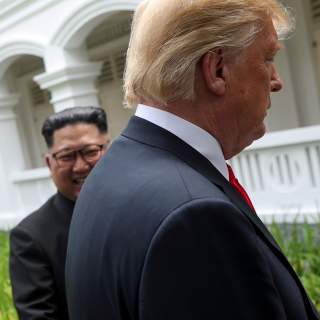The Hanoi Summit – We Asked Chiew-Ping Hoo What Happens Next in U.S.-North Korea Relations
"John Bolton, whose eleventh-hour addition to the Hanoi talk was believed to be the main reason for toughening Trump’s bargain, led to the no-deal outcome."
Editor’s Note: Looking for more opinions on where we go after the Hanoi summit? Check out all 80 expert takes on where U.S-North Korea relations go next here.
The “no deal” Hanoi summit has raised skepticism that the U.S.-North Korea denuclearization negotiation could overcome such a big setback as the prospect of confrontation looms larger than diplomacy. However, reading the tea leaves of the domestic political conditions in both the United States and North Korea would suggest that Trump and Kim will still be committed to summit diplomacy.
This is because both Trump and Kim had presented the summits between them as a successful historical breakthrough to their respective domestic audience. Trump has the liability of answering to the U.S. Congress. But Kim has to convince his political and military elites that engaging their arch-enemy the United States is the way to go after his Byungjin policy (parallel nuclear weapons and economic development) has accomplished the nuclear weapons program. Whether the program will be negotiated away is another story, but at this stage, gaining status quo-changing concessions from the United States is the main objective of Kim.
At the Hanoi Summit’s press conference, Trump had consistently assured the media that Kim had promised to continue to impose nuclear and missile test moratorium and that secretary of state Mike Pompeo and special representative Stephen Biegun will continue the talks with the North Koreans. However, the stories that followed—the North Korean diplomat’s late-night press conference, Trump’s apparently clarification of denuclearization to include curbing all types of weapons of mass destruction capabilities—would not seem to work to convince North Korea to continue negotiations. This hardline position is believed to be instilled by U.S. National Security Advisor John Bolton, whose eleventh-hour addition to the Hanoi talk was believed to be the main reason for toughening Trump’s bargain and led to the “no deal” outcome.
The discrepancy within the Trump administration at this stage is believed to be tactical (for Trump to assert a tough posture amidst Cohen’s hearing) rather than a long-term condition, as the North Korea Special Envoy team led by Biegun would try to convince their president and assure South Korea’s Moon Jae-in government that they will continue to negotiate with North Korea.
But long-time observers and researchers on North Korea would agree that North Korea is the ultimate power-player that would define the progress and outcome of a negotiation. Any missteps taken by the Trump administration will not be able to hold North Korea accountable for breaking the promise of denuclearization.
Option one for the United States would be to go back to the pre-Hanoi agreement: partial sanctions relief for the dismantlement of the Yongbyon nuclear complex. This was supposed to be the concrete outcome for the Hanoi Summit, and it would be easier for both sides to pick up after the disruption of no deal.
Option two would aim at gaining concessions for the already-implemented agreements, such as ceasing major U.S.-South Korean military exercises. This is the least preferred option for Washington as it would impair U.S.-South Korean military readiness in case of any inadvertent North Korean military provocations. However, the Moon Jae-in government has engaged with North Korea on this area through military confidence-building measures, which would allow the Trump administration to pursue this course but ultimately betray the U.S. traditional belief in supporting its allies.
Another scenario would involve South Korea and/or China playing the mediating and facilitating roles to resume the U.S.-North Korea negotiations. The Moon government is under pressure to leave a long-lasting legacy of establishing a peace regime on the Korean Peninsula, thus would continue to play this role in U.S.-North Korea reconciliation. China, in comparison, has a more realistic expectation that the issue will not be resolved swiftly, but would be supportive of any progress that would lead to U.S.-North Korea reconciliation, especially any U.S. security guarantee to North Korea. Some may argue that would harm China’s interest, but between a provocative nuclear North Korea and a “peaceful” nuclear North Korea, China would choose the latter.
Dr. Chiew-Ping Hoo is a professor at the National University of Malaysia. She is the Senior Lecturer in the Strategic Studies and International Relations Program.
Image: Reuters

